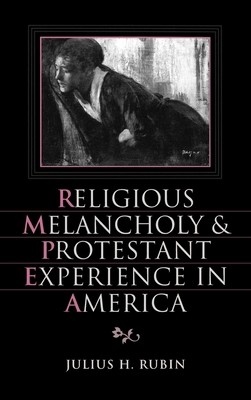
- We will send in 10–14 business days.
- Author: Julius H Rubin
- Publisher: Oxford University Press, USA
- ISBN-10: 0195083016
- ISBN-13: 9780195083019
- Format: 16.2 x 24.4 x 2.6 cm, hardcover
- Language: English
- SAVE -10% with code: EXTRA
Religious Melancholy and Protestant Experience in America (e-book) (used book) | bookbook.eu
Reviews
Description
This original examination of the spiritual narratives of conversion in the history of American Protestant evangelical religion reveals an interesting paradox. Fervent believers who devoted themselves completely to the challenges of making a Christian life, who longed to know God's rapturous love, all too often languished in despair, feeling forsaken by God. Ironically, those most devoted to fostering the soul's maturation neglected the well-being of the psyche. Drawing upon many sources, including unpublished diaries and case studies of patients treated in nineteenth-century asylums, Julius Rubin's fascinating study thoroughly explores religious melancholy--as a distinctive stance toward life, a grieving over the loss of God's love, and an obsession and psychopathology associated with the spiritual itinerary of conversion. The varieties of this spiritual sickness include sinners who would fast unto death ("evangelical anorexia nervosa"), religious suicides, and those obsessed
with unpardonable sin. From colonial Puritans like Michael Wigglesworth to contemporary evangelicals like Billy Graham, among those who directed the course of evangelical religion and of their followers, Rubin shows that religious melancholy has shaped the experience of self and identity for those who sought rebirth as children of God.
EXTRA 10 % discount with code: EXTRA
The promotion ends in 17d.05:50:55
The discount code is valid when purchasing from 10 €. Discounts do not stack.
- Author: Julius H Rubin
- Publisher: Oxford University Press, USA
- ISBN-10: 0195083016
- ISBN-13: 9780195083019
- Format: 16.2 x 24.4 x 2.6 cm, hardcover
- Language: English English
This original examination of the spiritual narratives of conversion in the history of American Protestant evangelical religion reveals an interesting paradox. Fervent believers who devoted themselves completely to the challenges of making a Christian life, who longed to know God's rapturous love, all too often languished in despair, feeling forsaken by God. Ironically, those most devoted to fostering the soul's maturation neglected the well-being of the psyche. Drawing upon many sources, including unpublished diaries and case studies of patients treated in nineteenth-century asylums, Julius Rubin's fascinating study thoroughly explores religious melancholy--as a distinctive stance toward life, a grieving over the loss of God's love, and an obsession and psychopathology associated with the spiritual itinerary of conversion. The varieties of this spiritual sickness include sinners who would fast unto death ("evangelical anorexia nervosa"), religious suicides, and those obsessed
with unpardonable sin. From colonial Puritans like Michael Wigglesworth to contemporary evangelicals like Billy Graham, among those who directed the course of evangelical religion and of their followers, Rubin shows that religious melancholy has shaped the experience of self and identity for those who sought rebirth as children of God.


Reviews